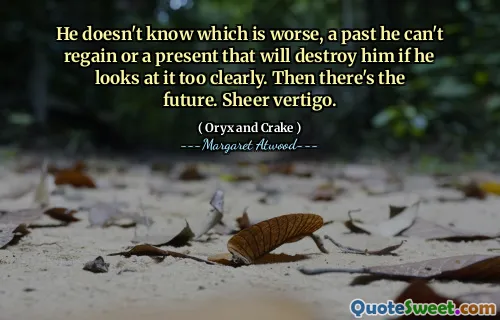He loved her so much when he made her unhappy, or else when she made him unhappy: at these moments he scarcely knew which was which. He would pat her, standing well back as with strange dogs, stretching out his hand, saying, "I'm sorry, I'm sorry." And he was sorry, but there was more to it: he was also gloating, congratulating himself, because he'd managed to create such an effect.
In "Oryx and Crake," the narrator reflects on a complex relationship marked by both deep affection and underlying turmoil. The protagonist experiences emotional confusion during moments of unhappiness, whether caused by his beloved or stemming from his own actions. This duality blurs the line between love and frustration, leading him to feel a mix of regret and a strange sense of satisfaction.
His interaction with her reveals a paradox; while he expresses remorse for their conflicts, he also finds a dark pleasure in realizing the extent of his influence over her emotions. This highlights a troubling aspect of their bond, where love is intertwined with power dynamics, suggesting that profound feelings can exist alongside manipulation and emotional distress.






